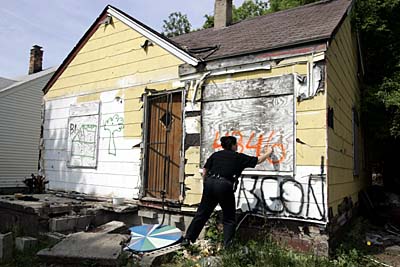Should camera-based alley monitoring be considered for DC?
 Scenes of illegal dumping in Inkster. The city of Inkster is one of two metro areas, Detroit is the other, that is testing a high tech camera to catch people that illegally dump trash. The camera, which has a range of 100 feet, will be used on a trial basis for 60 days. Photos taken on Wednesday, June 8, 2005. (The Detroit News/John T. Greilick)
Scenes of illegal dumping in Inkster. The city of Inkster is one of two metro areas, Detroit is the other, that is testing a high tech camera to catch people that illegally dump trash. The camera, which has a range of 100 feet, will be used on a trial basis for 60 days. Photos taken on Wednesday, June 8, 2005. (The Detroit News/John T. Greilick)Alley safety and dumping issues are always of concern to urban residents. Last week, a dead burning body was discovered in the alley between H Street and Linden Place. Illegal auto repair and dumping, drug sales, and other acts plague the residents that abut the alley. ANC6A SMD02 Commissioner (and Chair) Joe Fengler have and residents have successfully advocated for greater DC government involvement and coordination of activity to address these problems. (More more information on the District Government's MAP--Multi-Agency Plan--for the area bounded by 12th and 14th Streets, and Linden Place and Wylie Place, see this document from the ANC6A website.)
In Columbia Heights, the issue of alley safety is high on the radar as well. From the columbia_heights@yahoogroups.com email list is this message:
I've noticed a spike in alley incidents and crime located between the 12th and 13st Euclid and Clifton. It seems like the series of alleys that connect our blocks to yours is being used for illicite activities. In the last 4 months I've had 4 breakins in my garage, I've come across one lurker (a guy waiting and hiding) and another hooded individual whose shirt was stuffed with objects other than his own body. (He also hid when he saw me.) I've come across drug-users, dealers and prostitution...
Last week, the Detroit News reported, in "Cameras may capture dumping: Detroit and Inkster crack down on graffiti and illegal trash with high-tech Flash-Cams," how certain Michigan communities are beginning to address some of these issues:
Detroit and Inkster are testing a cutting-edge approach to catching graffiti artists and illegal dumpers. For the next month and a half, both cities will test a battery-powered camera called the FlashCam-530 to document wrongdoing. The two cities got cameras June 1; they were installed by a California-based company called Q-Star Technology.
Inkster hasn't caught any illegal activity, and has moved its camera's location from its original site. But it's still early and there are plenty of kinks to work out, said Police Officer Dawn Wall. Detroit's camera has captured some pictures of people who apparently stopped plans to dump because they saw the camera. "We're still doing the fine-tuning on the range location and angle," Wall said. "When we can identify an offender with a license plate number and picture, then that will allow us to prosecute efficiently."
The cameras were installed at no cost to the municipalities or taxpayers. After the 60-day trial, each city will have the option to purchase cameras for $3,500-$5,000.
I distributed the article on a neighborhood email list, which led Rich Luna, a resident of Linden Place, to suggest that the District Government install one of these cameras on Linden Place as a test. This is the response he received:
As I mentioned at the meeting the other night, current regulations prohibit MPD from using such cameras for law enforcement purposes. If you think those regulations should change, I urge you to contact your Councilmembers and others. The Mayor and the Chief would love to see that change & we're planning to make that proposal.
Edward D. Reiskin, Deputy Mayor for Public Safety & Justice
__________
This is a tough issue. The civil libertarian in me hesitates to give this power to the government to monitor our public spaces. Like with the eminent domain discussion of late, such powers need to be exercised with great restraint, care, and responsibility, yet all too often these powers are misused (i.e., the arrest without cause of hundreds of demonstrators in Pershing Park -- "D.C. Settles With Mass Arrest Victims: 7 Rounded Up in 2002 IMF Protest to Get $425,000 and an Apology" or this editorial from the Post "A Bust in Pershing Park."
But how do we reduce the kinds of problems residents are having? Is a very limited monitoring system with a limited purpose in a geographically defined area a good thing, or movement down a slippery slope?



0 Comments:
Post a Comment
<< Home